2023
Autumn/Winter 2023
Award ceremony at the Arcadia Ichigaya, Tokyo,
on 11 November 2023



See the video (about 5 minutes)
Lecture and reception at the residence of the Netherlands ambassador, Tokyo, on 17 November 2023
Chargé d'Affaires ad interim Theo Peters hosted a lecture by Hans Brinckmann at the residence of the Netherlands ambassador on Friday 17 November 2023 from 18:00hr. This lecture was organized on the occasion of the awarding of the "Best Essay Writing" prize in the 26th Japan Self-Publishing Culture Awards of Mr. Brinckmann's The Call of Japan: A Continuing Story — 1950 to the Present Day in Hiromi Mizoguchi's Japanese translation.
Brinckmann gave a lecture on his book in which he reflects on his long history with Japan.
Brinckmann first came to Japan in 1950 as a junior employee of a Dutch bank with branches all over Asia, including Japan. Aged only 18 years old, he was ready to learn from Japan's society, which was completely different from the country of his birth, the Netherlands. The book focuses not only on his private life with its many ups and downs, but more importantly on Japan's post-war history and its change from defeat in the 2nd World War to one of the world's leading and most successful economies. He also features some of Japan's fundamental problems and vulnerabilities, and the lessons we can learn from Japan.
The Call of Japan: A Continuing Story — 1950 to the Present Day was published by Renaissance Books in London in July 2020. The Japanese translation of the book, Watashi to Nihon no Nanaju-nen meaning "Me and Japan over 70 years," was published by Nishida Shoten in Tokyo in September 2022.
Brinckmann talked about 30 minutes in front of the 45 people, then Mizoguchi briefly introduced the comment by the judges. Brinckmann`s lecture and Q and A were followed by a happy and joyous reception.
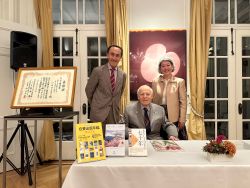
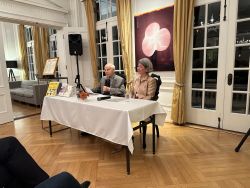
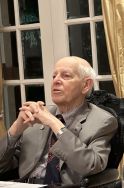
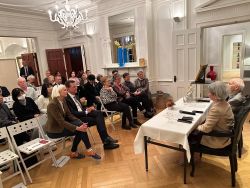
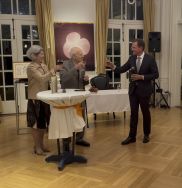
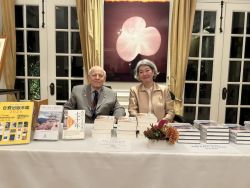
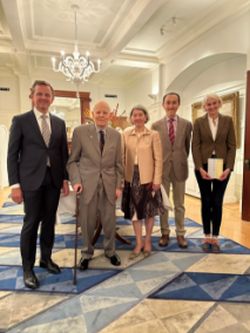
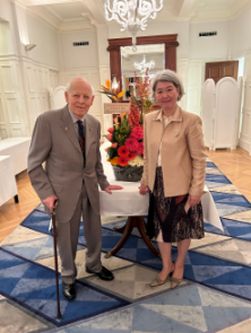
Spring/Summer 2023
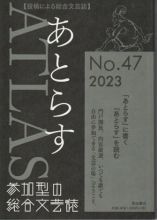 |
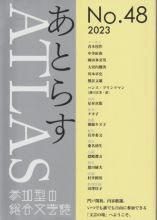 |
The Japanese literary magazine Atlas has been publishing - in every half-yearly issue since July 2014 - Hiromi Mizoguchi's translation of Brinckmann's essays. Its January 2023 issue No.47 and July 2023 issue No.48 featured Brinckmann's memoir of the 1944/45 the winter of starvation, entitled The Monkey Dance – Chronicle of a 12-year old Dutch boy in the Winter of Starvation, 1944-1945.
The memoir was earlier self-published in English. Anyone wishing to buy a copy of the memoir, priced at Yen 700 plus postage, should contact me at info+habri.jp (change + into @ before sending your message)
Its original Dutch text is now available as an online version that can be found by clicking on this link: https://oorlogsverhalen.com/oorlogsverhalen/hans-brinckmann/
The Nature of Kyoto: Writers in Kyoto Anthology 5
 |
Brinckmann's essay, "Restaurant Boer," received the Third Prize for the 6th Annual Kyoto Writing Competiion organized by Writers in Kyoto in May 2021 (we reported this news in Attention! back in May/June 2021). Their latest anthology includes his essay.
Writers in Kyoto
https://www.writersinkyoto.com
Judges' comments:
THIRD PRIZE:
"Restaurant Boer" by Hans Brinckmann
This was a lovely and generous narrative, full of interesting details about the first Dutch restaurant in Kyoto, and told with humor and warmth. The judges felt that the author was right there, telling us his personal story. While there were cultural factors in the enterprise which caused confusion, it was a delight to see that there was a happy ending after all. It is the imagery of the bridge at the end that makes this brief tale so engaging. A restaurant may have gone by the wayside only to make way for a lifelong partnership.
2022
October 31
APENDANS: Kroniek van een 12-jarige Haagse jongen in de hongerwinter van 1944/1945
My memoir of the 1944/45 the winter of starvation, earlier published in English, has finally found a publisher in its original Dutch. It is an online version that can be found by clicking on this link: https://oorlogsverhalen.com/oorlogsverhalen/hans-brinckmann/
Of course, it can only be read by readers with a knowledge of Dutch. The story will also be published in the literary magazine Atlas, in two or three instalments, in Hiromi Mizoguchi's Japanese translation.
November 16
Book Review of Japanese translation of Hans Brinckmann's book, The Call of Japan
(The following is the English translation by Hiromi Mizoguchi of the original review in Japanese)
 |
Ten books which business leaders must read to see into the essence of things
Reviewed by Kazuyoshi Ishiguro for Zaikai magazine (2022 November 16 issue)
Mr. Ishiguro was born in 1944 in Aichi prefecture. Graduated from the department of engineering in 1967, and the department of law in 1970, of Nagoya University. He served as president/chairman/chief advisor of IT companies in Japan. He has studied Buddhism at Bukkyo University and currently he is working on his doctoral program. He published books on business and Sumo.
Zaikai is a biweekly business magazine. They have a wide range of readership from corporate managers to entrepreneurs with a circulation of 53,000.
"It is not at all easy to see into the essence of things. You have to keep your curiosity high and never stop questioning. I would like to introduce ten books that may be useful for you to spend the coming years of your life and enrich it.
Italian Journey: 1786-1788 by Johann Wolfgang von Goethe
Kodoku to iu michizure (What keeps me busy and fulfilled everyday) by Kishi Keiko, famous Japanese actress
Book of the Dead: Tibetan religion by Nakazawa Shinichi, Japanese anthropologist
Watashi to Nihon no Nanajunen (Me and Japan 70 years) by Hans Brinckmann
Mikaku Hourai by Uoya Tunekichi, Zen monk and cooking expert
Kim by Rudyard Kipling
Russians by Izutsu Toshihiko, Japanese linguist and philosopher
Laughter is the Best Medicine by Norman Cousins
The Fox by Frederick Forsyth
Kirawareta Kantoku by Suzuki Tadahira, Sportswriter
Watashi to Nihon no Nanajunen by Hans Brinckmann
Brinckmann came to Japan in 1950 at the age of 18. He was active on the frontlines of the Japanese economy and built a successful career as an international banker for 24 years in Japan while he played an important role for cultural exchange between the Netherlands and Japan through Nichi Ran Kyokai (JNS). He proclaims that 'I've always been attracted by Japan's generally caring, non-violent, balanced way of life.' I wonder: Do we still maintain such 'caring, non-violent, balanced way of life'?"
July
 |
The Japanese literary magazine Atlas has been publishing - in every half-yearly issue since July 2014 - Hiromi Mizoguchi's translation of Brinckmann's essays about remarkable people he had met. Its January 2022 issue No.46 featured Brinckmann's essay about Haramoto Tomio, a Japanese student who, in 1957, had launched a launched "Juen Shishu", a 20-page "Ten Yen Anthology of Poems." It was a very modest venture, started by four young people: a welder, a typist and two students, with Haramoto as the driving force. The poems, in free verse, were written by ordinary Japanese—labourers, fishermen, office workers, children. Some of the poets were physically handicapped.
Brinckmann has decided to share the English original of this essay with our Habri readers. If you wish to read it, please click here:
January
 |
The Japanese literary magazine Atlas has been publishing - in every half-yearly issue since July 2014 - Hiromi Mizoguchi's translation of Brinckmann's essays about remarkable people he had met. Its January 2022 issue No.45 featured Brinckmann's essay about the famous writer and translator of Japanese literature Edward G. Seidensticker whom he first met in Kyoto in 1957 under highly unusual circumstances.
 |
Brinckmann has decided to share the English original of his Seidensticker essay with our Habri readers. It is mostly about that first surprising meeting, in Kyoto. To read the essay, please click here:
2021
September/October 2021
On October 16, from 11 a.m., Hans Brinckmann gave a 50-minute online Zoom presentation for the 2021 Japan Writers Conference entitled: "Maintaining Close Connections with a Country or City can help your Career", richly illustrated with 50 photos, shown on Power Point. The talk received many positive reactions. As announced earlier to our readers, its recorded version is available on YouTube, and has already been viewed over 70 times. If you still want to see it, click here:
https://www.youtube.com/watch?v=8rjyCfrc848
We failed to report earlier that Kyoto Journal, in its #99 issue devoted to travel at the end of 2020, posted a laudatory review by its editor Ken Rogers of Brinckmann's latest book, The Call of Japan, together with an excerpt from the book, with photographs. The 219-page digital issue is still available for Yen 550 at:
https://www.kyotojournal.org/product/kyoto-journal-issue-99-travel-revisited-digital/
 |
 |
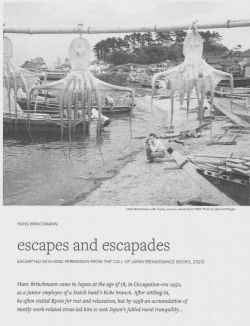 |
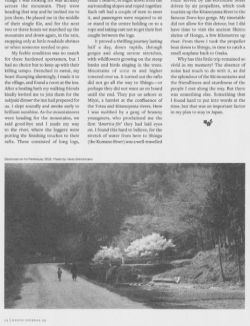 |
July/August 2021
 |
The Japanese literary magazine Atlas in its July 2021 issue No. 44 published Hiromi Mizoguchi's translation of Hans Brinckmann's essay entitled "Shirayuri – a Life Redeemed." It is the life story of Shirayuri, a Japanese lady in Kyoto, who introduced Hans in 1958 to Yoshida Toyoko, who was to become his wife the following year. It covers Shirayuri’s life from a young age – when she became a playmate of Toyoko’s mother – through her long years of serving as a geisha and experiencing serious setbacks, until her peaceful end in 1962. It is the longest of the 13 essays that appeared in Atlas so far, and attracted much acclaim.
It will eventually appear in Hans' collection of memorable people he has met in the course of his life.
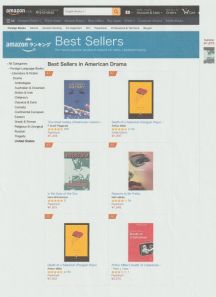 |
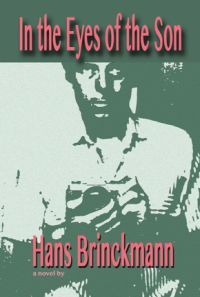 |
Hans’s novel In the Eyes of the Son (Savant Books, 2014) won an Honorable Mention Award at the 2015 Pacific Rim Book Festival in Honolulu, Hawaii. On July 23, 2021, it briefly ranked 3rd among Best Sellers in American Drama on amazon.co.jp. The book – which attracted several laudatory reviews – is also available on amazon.co.uk, amazon.com and amazon.nl.
This is the right time to order a copy. You will enjoy it!
May/June 2021
Earlier this year, I entered the 6th Annual Kyoto Writing Competition organized by Writers in Kyoto, an association of English-language writers living and/or working in Kyoto, and writers like me who have an old-established "connection" with Kyoto. Any genre of writing was welcome as long as it had a "Kyoto connection", and the length was limited to 300 words.
On May 15, WiK reported that they had received a large number of "submissions from writers of various nationalities, based in twenty-one countries throughout the world... While it was difficult for the judges to settle on their final decision, the winners of the Sixth Annual Kyoto Writing Competition are as follows:"
To my great surprise, I was awarded THIRD PRIZE for my brief non-fiction narrative, "Restaurant Boer."
These were the judges' comments:
THIRD PRIZE:
"Restaurant Boer" by Hans Brinckmann
This was a lovely and generous narrative, full of interesting details about the first Dutch restaurant in Kyoto, and told with humor and warmth. The judges felt that the author was right there, telling us his personal story. While there were cultural factors in the enterprise which caused confusion, it was a delight to see that there was a happy ending after all. It is the imagery of the bridge at the end that makes this brief tale so engaging. A restaurant may have gone by the wayside only to make way for a lifelong partnership.
Here is the full text of the story:
Restaurant Boer
In the spring of 1958, I assisted a close friend, Shoko Fujii, in setting up a small Kyoto eatery in Kiyamachi, Shijo-sagaru, in a rented space owned by a gynecologist, right on the narrow Takasegawa. From the options I offered, she chose the name Restaurant Boer (meaning Farmer), the first Dutch restaurant in Kyoto, if not in Japan. It featured smoked eels, hearty soups, and – as the house specialty – very tasty veal-and-bacon rolls known in Holland as 'blinde vinken', blind finches. The approximate translation, mekura-no-suzume, blind sparrows, sounded so intriguing that we were sure this would guarantee the success of this start-up.
Besides fresh vegetables, they were served with potatoes, jaga-imo in Japanese, introduced by 17th century Dutch traders from the Indonesian capital Jakarta, jagatara in old-Japanese, thus named jaga-imo, imo meaning tuber. Other meals were also served, such as cheese dishes and Jachtschotel, a hunter's stew.
But after a brief spell of bookings, customer numbers declined fast, perhaps in part because of the shock caused by the mekura-no-suzume, not the taste, but its appetite-destroying name. And the term Boer didn't help either: what was a "farmer restaurant" doing in Japan's sophisticated, ancient capital? The restaurant closed its doors within a year.
But at least there was a happy ending: it was in front of Boer that in October 1958 I was introduced in mi-ai style to my future wife, Toyoko Yoshida. Why "in front"? Because although we had planned to meet at Boer, a funeral procession had just crossed the bridge to Boer. "Bad omen!", she called out. "I avoid that bridge!" Instead, I crossed to her side, and from then on, everything went well. We clicked, found common interests, and married four months later. We had a happy marriage.
 Location of Restaurant Boer (1958) |
 Hans in front of Boer's old location (photo taken in 2010) |
 Blind finches – Mekura-no-suzume |
January/February 2021
On January 24, Hans Brinckmann gave an online Zoom lecture with Power Point illustrations, hosted by the Netherlands-Japan Association (NJV) in the Netherlands, entitled "70 Years in Japan's Post-War History - Individual Memories, Collective Experiences."
 |
The talk was remotely attended by an audience of about 70, mostly NJV members but also non-members from different countries. It was largely based on Hans' earlier presentation for The Japan Society in London, on October 18, 2020, and attracted many positive comments. That lecture can still be viewed by clicking here
It also served to promote Hans' book, The Call of Japan: A Continuing Story – 1950 to the Present Day (Renaissance Books, UK, July 2020), which continues to attract highly favourable reviews.
 |
The Japanese literary magazine Atlas in its January 2021 issue No. 43 published Hiromi Mizoguchi's translation of Hans Brinckmann's essay about Norman Carver, a fascinating American Architect, Photographer and Writer, from Kalamazoo, Michigan, whom he met on the Angkor Wat Temple in Cambodia in 1964, and with whom he stayed in touch over the years. A famous Japanese movie director got inspiration from one of Norm's photobooks.
It will eventually appear in Hans' collection of memorable people he has met in the course of his life.
2020
November/December 2020
In 1995, while living in Sydney, I wrote a long poem entitled "The Ballad of Hope Hill." Someone suggested I should have it set to music, and through the help of friends I came in contact with Pablo Escande, an Argentinian composer, living and working in Amsterdam. He liked the poem and agreed to compose suitable music for it. Later he told me that the poem had inspired him so much that sometimes he worked deep into the night to compose the music for it.
On February 18, 2000, it was performed in Concert Hall Kadens in Haarlem, the Netherlands, with Pedro Adarraga as counter-tenor, and Pablo at the piano. Later they performed it again, in Hilversum, and this time it was recorded.
Now, at long last, Pablo has uploaded the 2000 recording on YouTube, where you can find it by clicking here
In 2011, Pablo moved to Japan with his Japanese wife Sakurako Mitsuhashi – who is a harpsichord player – and since then they have lived in Kyoto, both pursuing their musical career.
 |
The poem was included in my English/Japanese collection of poetry, The Undying Day (Trafford Publishing, 20101), which was very positively reviewed by Stephen Mansfield in The Japan Times of November 6, 2011, from which I quote:
"Consistently, Brinckmann casts himself as mediator, a conducting material recharged by the stream of time. Where some poets, even great ones, resist the vision of anything finer than a futile individual existence, Brinckmann celebrates life's brimming energies, even as they discharge into more temperate currents with the advance of age.
……
The collection ends with 'The Ballad of Hope Hill,' a longer work rendered in a style vaguely contemporaneous with Mathew Arnold and Arthur Hugh Clough, but otherwise timeless, tidal, cyclical in its optimism. This Orphic poem, unfolding the concealed patterns of human nature and history, is the book's coda."
"The Undying Day" is available on amazon.com, amazon.nl, amazon.co.uk, and amazon.co.jp. Just look for "Hans Brinckmann" and you will all my books.
September/October 2020
 |
Reviews of Hans Brinckmann's book, The Call of Japan
Hans Brinckmann's new book, The Call of Japan, A Continuing Story – 1950 to the Present Day, published in July 2020 by Renaissance Books in the U.K., has attracted some very positive reviews from professional writers:
For the Japan Society, by Roger Buckley – click here
For The Japan Times newspaper, by Stephen Mansfield – click here
For JapanToday, by Henry Hilton – click here
In addition, the following reviews were received from other readers:
"I just read the book THE CALL OF JAPAN by HANS BRINCKMANN and was pleasantly surprised by his thorough knowledge of Japan and Japanese customs and traditions. You might call this a critical love story.
The book is a nice combination of his personal life in Japan from his arrival at age 18 as a bank employee in the Kobe/Osaka area, his later marriage to a Japanese girl of a high-class family background, and his years as general manager of his bank's offices in Japan.
His active travelling through Japan in his spare weekend time, analyses of the character and customs of his many Japanese contacts and how to get along in business, all contribute to the book.
Hans left banking in 1988, and now lives in Fukuoka as a full-time writer. He studied the Japanese language, helping him to get better acquainted with the country and its customs and traditions.
Much has changed since I myself lived in Japan from 1951 – 1962 but also much sounds familiar.
Brinckmann's book is for anyone interested in Japan. Read it, you will like it!"
(Review by H. van Rossum, Netherlands)
*****
"This is the story of a young Dutchman who, after having withstood the vicissitudes of WW2 in his home country, had to embark on a life in a totally foreign country on the other side of the globe. At the tender age of eighteen he is whisked off without any parental or other guidance to spend his youth in a nation suffering from the aftermath of a vicious war. Remarkable is that he does not flee from it but submerses himself in it. Brinckmann gives an absorbing account how he, as a young man, comes to grip with the intricacies of customs, culture and mentality of Japan. This sets him apart from other foreigners living in Japan who escape into a simulation of their home countries' way of life.
We follow the young Hans developing a great affinity to the culture. Nevertheless, he feels obliged to make a success of his banking career too. And so he does, becoming a bank manager finally. Artistic by nature he fulfills also his prime calling to author books, articles and lectures, in that way contributing to a deeper understanding of the country he so much loves. He was assisted thereby by his Japanese wife, descendant of a cultural, highborn family and after her death by language specialist Mizoguchi Hiromi.
In the course of his long residence in Japan, Hans made acquaintance with people of all walks of life up to the emperor-to-be. By means of anecdotes and observations he tells us the background of the country's sometimes-strange customs and habits. He even ventured into Zen-Buddhism and other religious movements.
Brinckmann has now reached an age to look back upon life. Hardly any 'foreigner' can boast of seventy years' experience in Japan as he did after having lived for more than forty years in this enchanting country and staying in contact with it in the intermediate years.
A book one should read to get a deeper understanding of this great country and its culture."
(Review by Y.C. Rogge, Netherlands)
*****
"Maestro!
Your lucid, romantic and poetic, entertaining and many-sided The Call of Japan, and often also a true adventure story, is sublime in its genre. It is worthy of a heartfelt congratulation, not least because of your excellent, enviable, sophisticated use of language, your careful structuring - and more. This intelligent and persuasive master class deserves frequent reprints and translation into Japanese.
You have made me feel that I am a partner in your life, that has reached its full potential. As author, you have in your hands the reins of an unruly team of horses, which help you relive your adventurous life under the eyes of an unknown readership. You only live twice.
The Call of Japan is truly multifarious. You intertwine diplomatic and extremely candid commentary, supported by sociological insight. There are two of you: a social-anthropologist, who uses classic, participating observations, and a narrator, who shares well-structured personal adventures in a synchronised (inter-)national context."
(Review by Dolf van Graas, Japan)
*****
"I have read The Call of Japan and need to tell you from the outset there is no way that I can do justice to a response since it has had such an important impact on me.
The top of my thoughts is your descriptions of the Japanese culture and its effects on individuals. You describe your experiences and insights with exquisite word pictures that have acted as a mirror to many of my own experiences...connecting you the writer with I the reader!
You are a most rare being...successful in the banking world, and as a writer, unusual balance is obvious. You have many developed facets in your being...utterly impressive. It only happens with the devotion, diligence and likely lifetimes of effort!
Your life's experiences and living locations are truly beyond the beyond!
Really, I could go on and on about the sheer pleasures and education that your insights brought me, so I need to make it clear my views are insignificant relative to the outstanding history you present."
(From the review by Jennifer Shima, USA)
Brinckmann's recent Online Lectures
-
On October 18, for The Japan Society in London:
an online talk via Zoom with Power Point illustrations entitled: "70 years in Japan's Postwar History: Individual Memories, Collective Experiences."
This one-hour event was remotely attended by over 85 members and non-members, and was also intended to promote my new book, The Call of Japan. Many very positive reactions were received during and after my talk.
For those of you who had wanted to join the event but were unable to, here is the recording of the event, complete with the Power Point images: https://youtu.be/PWMUkRCet5Y -
On October 11, for the annual Japan Writers' Conference:
an online talk with Power Point illustrations entitled: "A theme-oriented memoir, based largely on a personal journal, is an effective way to convey one's thoughts to readers."
The talk was well received by the remote audience of over 25 members.
July/August 2020
 |
The Japanese literary magazine Atlas in its July 2020 issue No. 42 published Hiromi Mizoguchi's translation of my essay about Iwaichi Waimatsu, fisherman's son & foreign bank's chief clerk, a memorable former colleague of mine in the 1950s and 60s. Mr. Waimatsu, called "Big W" by the Dutch staff, was the first member of the Japanese staff I was introduced to when I arrived in November 1950 at the Kobe branch of a Dutch bank. I was 18 at the time, and learned much from Big W.
The chief editor of Atlas called the essay a "eulogy for Mr. Waimatsu." It will eventually appear in my collection of memorable people I have met in the course of my life.
January/February 2020
 |
The Japanese literary magazine Atlas in its January 2020 issue No. 41 published Hiromi Mizoguchi's translation of Hans Brinckmann's essay about his old friend Janwillem van de Wetering, Zen student, policeman, and celebrated crime writer.
It is the lead article in this issue.
The essay will eventually appear in Brinckmann’s collection of memorable people he has met in the course of his life.
2019
January/February 2019
New Publication and New Promotions:
 |
 |
 |
The Japanese literary magazine Atlas in its January 2019 issue No. 39 published Hiromi Mizoguchi's translation of my story, "Twice upon a Plum Tree," taken from my award-winning book "The Tomb in the Kyoto Hills and other stories" (Strategic,2011).
And, as reported in Habri Diary, Tuttle Publishing has launched a new promotional campaign for my republished book "Showa Japan - The Post-War Golden Age and its Troubled Legacy." With the "legacy" - the Heisei era - soon coming to an end when the Emperor Akihito abdicates in favor of his son, it is considered the right moment to bring the book once again to the attention of readers interested in Japan's history. At Maruzen and other book stores the book is available for purchase at a price of Yen 1,100. See also Tuttle Publishing website: http://tuttle.co.jp/products/show/isbn:9780804850889/language:en
To order The Tomb or other books by Hans Brinckmann online - go to: https://www.amazon.co.jp/s/ref=nb_sb_noss?url=search-alias%3Denglish-books&field-keywords=hans+brinckmann
Recent Event:
At the invitation of Writers in Kyoto, a group of English-speaking writers living or working in Kyoto, I gave a lecture on "Kyoto in the 1950s" based on my own experiences and impressions during that decade. The talk was illustrated by Power Point with photos taken by me during the 1950s. The audience's reaction to the lecture far exceeded our expectations, and my talk also received a very favourable review by Writers in Kyoto - click here.
July/August 2019
New Publication
 |
The Japanese literary magazine Atlas in its July 2019 issue No. 40 published Hiromi Mizoguchi's translation of my essay "Cactus Soup and Divi-divi Trees." It is about reminiscences of life on the Caribbean island of Curaçao, from 1976 to 1979. What did Hans Brinckmann and his wife Toyoko discover on the island of healing?
The essay – including illustrations – covers 10 pages, and is the lead article in this issue.
Brinckmann's Prize-winning books:
We want to draw your attention to Hans Brinckmann’s three books that won literary prizes at the Pacific Rim Book Festivals in 2015 and 2016:
In the Eyes of the Son, a novel; The Tomb in the Kyoto Hills, a collection of short stories set in Kyoto; and The Undying Day, an English/Japanese bilingual collection of poetry, by Hans Brinckmann and Hiromi Mizoguchi. They are available in print as well as in digital Kindle form. For details and to order, please go to
amazon.com
amazon.co.uk
amazon.co.jp
 |
 |
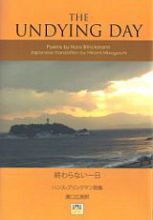 |
September/October 2019
Recent Event:
The annual Japan Writers Conference was held this year in the Meiji Gakuin University in Tokyo. Though planned for two days, October 12 and 13, the first day had to be cancelled because of the approaching monster typhoon Hagibis. All lectures planned for Saturday were added to the Sunday program.
Brinckmann gave a talk on Sunday entitled: "How giving talks and lectures on any suitable subject can help promote your books." As some five other presentations were going on simultaneously in other rooms, attendance was less than expected, but the talk was well received.
 |
 |
 |
2018
January/February 2018
New Publications:
 |
The Japanese literary magazine Atlas in its January 2018 issue No. 37 published Hiromi Mizoguchi's translation of Hans Brinckmann's essay about his meeting in Washington D.C. in 1985 with Republican Senator Jake Garn, who had just returned from space as the first U.S. member of Congress to fly on a Space Shuttle.
 |
Also in January, No. 1 Shimbun, the monthly magazine of the Foreign Correspondents Club of Japan in Tokyo, published Hans Brinckmann's essay entitled "His Hidden Acting Talent: A Memorable Evening with Konosuke Matsushita, the founder of Panasonic, in 1967"
Interested readers can access the essay by clicking on this link:
http://www.fccj.or.jp/number-1-shimbun/item/1023-his-hidden-acting-talent.html
Hiromi Mizoguchi's translation of this essay appeared earlier in Atlas No. 31 in January 2015.
Upcoming Event:
On February 28, from 18:30, Hans Brinckmann will be giving a presentation at the Royal Netherlands Embassy in Tokyo entitled "The Challenges of Dutch Life and Work in Post-War Japan."
Illustrated with Power Point, he will talk about his many unforgettable experiences as a Dutch national living in Japan from the 1950's to the early 70's and the role his bank played in Japan's post-war recovery.
The event is free and open to the public, but prior registration is required by February 23. See below for details and how to apply.
 |
The Challenges of Dutch Life and Work in Post-War Japan - Presentation by Hans Brinckmann
Date: Wednesday 28 February 2018
Time: 18:15 - 20:30
Timeline:
18:15 : Doors open
18:30-18:35 : Introduction
18:35-19:30 : Presentation by Hans Brinckmann with Power Point + Q&A
19:30-20:30 : Networking drinks and buffet
20:30 : Closing
Address: Residence of the Ambassador of the Kingdom of the Netherlands to Japan 3-6-3 Shiba-koen, Minato-ku, Tokyo 105-0011, Japan (MAP☆)
Language: English (without interpretation)
Entrance fee: Free
Summary:
Hans Brinckmann, Dutch national and long-time resident of Japan, will talk about his experiences living in Japan from 1950-1974, illustrated with his photographs from that period.
Outline:
Hans Brinckmann came to Japan as a junior staff employee of the Nationale Handelsbank (NHB) in 1950, two years before full diplomatic relations between Japan and the Netherlands resumed after the war. Over the next 24 years, he worked in the NHB branches in Kobe, Osaka and Tokyo. After Japan, he worked in several other countries, ending with an 8-year stay in New York, where in 1986 Queen Beatrix made him an Officer in the Order of Oranje-Nassau. He quit banking in 1988, to turn to writing. Since then, he published six books, two of which were also published in Japanese, in Hiromi Mizoguchi's translation. Three of his books received literary prizes. In 2003 he returned to live in Tokyo again, and in 2013 he moved to Fukuoka.
In today's presentation, he will talk about his many unforgettable experiences as a Dutch national living in Japan from the 1950's to the early 70's and the role his bank played in Japan's postwar recovery.
For more information on Hans Brinckmann, please visit his websites.
English/Japanese website: www.habri.jp
English website: www.habri.co.uk
Amazon page: www.amazon.com/author/hans-brinckmann
Registration: LINK (google docs) (Click the link to register)
Registration deadline: Friday 23 February 2018. Due to limited seating, it is possible that the registration will be closed before the deadline. Thank you for your understanding.
Queries: Embassy of the Netherlands - Department for Public Diplomacy, Politics and Culture
Email: TOK-PPC@minbuza.nl
Recent Event:
Hans Brinckmann's Presentation at the Netherlands Embassy in Tokyo
 |
 |
 |
 |
On February 28, Brinckmann gave a presentation at the Netherlands Embassy in Tokyo on The Challenges of Dutch Life and Work in Post-War Japan, illustrated with his own period photos, projected by Power Point. The talk covered the social and business situation in Kobe, Osaka and Tokyo between Brinckmann's arrival in 1950 as a junior staff employee of a Dutch bank and his first home leave in 1956, and was based on his experiences and observations.
The presentation, attended by a mixed Japanese/international audience of about 60, was very well received. During the hour-long "networking" that followed the talk, many asked for "more:" what happened after 1956, including Brinckmann's mi-ai marriage to a Japanese literature graduate and the run-up to the 1964 Tokyo Olympics? Well, the embassy agreed to host a second presentation, see below.
Here are some photos of the event, taken by Habri's Hiromi Mizoguchi, who had made the arrangements for the presentation with the embassy's Policy Officer Ms. Kim Dang, shown below right.
Upcoming Event:
On Tuesday, June 5th, 2018, from 18:15, Hans Brinckmann will give a presentation at the Royal Netherlands Embassy in Tokyo entitled "Life, Work and Society in Japan between 1956 and the early1970s," based on his own experiences. Illustrated with Power Point photos, the talk will be held in response to popular demand as a follow-up of his presentation of February 28, also at the Embassy.
The event is free and open to the public, but prior registration is required by June 1st.
 |
"Life, Work and Society in Japan between 1956 and the mid-1970s"
- Presentation by Hans Brinckmann, follow-up to his February 28 presentation
Date: Tuesday, June 5th, 2018
Time: 18:15 - 20:30
Timeline:
18:15 : Doors open
18:30-18:35 : Introduction
18:35-19:45 : Presentation by Hans Brinckmann with Power Point + Q&A
19:45-20:30 : Networking drinks
20:30 : Closing
Address: Dejima Lounge at the Embassy of the Kingdom of the Netherlands to Japan 3-6-3 Shiba-koen, Minato-ku, Tokyo 105-0011, Japan (MAP☆)
Language: English (without interpretation)
Entrance fee: Free
Summary:
Hans Brinckmann, Dutch national and long-time resident of Japan, will talk about his experiences living in Japan from 1950-1974, illustrated with his photographs from that period. This is a follow-up to his presentation on 28th February, when he focused on the period 1950-1956. This time he will talk about the years 1956 to the mid-1970s.
Outline:
Hans Brinckmann came to Japan as a junior staff employee of the Nationale Handelsbank (NHB) in 1950, two years before full diplomatic relations between Japan and the Netherlands resumed after the war. Over the next 24 years, he worked in the NHB branches in Kobe, Osaka and Tokyo. After Japan, he worked in several other countries, ending with an 8-year stay in New York, where in 1986 Queen Beatrix made him an Officer in the Order of Oranje-Nassau. He quit banking in 1988, to turn to writing. Since then, he published six books, two of which were also published in Japanese, in Hiromi Mizoguchi's translation. Three of his books received literary prizes. In 2003 he returned to live in Tokyo again, and in 2013 he moved to Fukuoka.
In this presentation, he will talk about his experiences as a Dutch national living in Japan from 1956 to the mid-1970's, his unusual miai marriage, the role his bank played in Japan's postwar recovery, and the return of Japan to the ranks of A-class nations.
For more information on Hans Brinckmann, please visit his websites.
English/Japanese website: www.habri.jp
English website: www.habri.co.uk
Amazon page: www.amazon.com/author/hans-brinckmann
Registration: LINK (Click the link to register)
* The registration link is password protected. Password = Brinckmann
Registration deadline: June 1st, 2018. Due to limited seating, it is possible that the registration will be closed before the deadline. Thank you for your understanding.
Queries: Embassy of the Netherlands - Department for Public Diplomacy, Politics and Culture
Email: TOK-PPC@minbuza.nl
June
Recent Event:
June 5: Hans Brinckmann's presentation at the Netherlands Embassy in Tokyo
 |
On June 5, Brinckmann gave a presentation in the Dejima Lounge of the Netherlands Embassy in Tokyo on "Life, Work and Society in Japan between 1956 and the mid-1970s". It was a follow-up on a similar presentation at the Embassy on February 28, 2018, which covered the period from 1950 – when Hans first arrived in Japan – and 1956, his first home leave in six years.
Apart from details about social and economic conditions in Japan during that period, the lecture also contained some facts about Hans' personal life, such as his miai kekkon (marriage through introduction) in 1959.
Recent Publication:
 |
In the May issue of their "Number I Shimbun" magazine, the Foreign Correspondents Club of Japan published Brinckmann's essay, "Tapestries for the Empress" about a Polish Count who spent five years in Japan weaving tapestries to make a living and survived the 1923 Great Kanto Earthquake. Based on Hans' meeting with the Count in 1961.
Interested readers can access the essay by clicking on this link:
http://www.fccj.or.jp/number-1-shimbun/item/1067-tapestries-for-the-empress.html
Hiromi Mizoguchi's translation of this essay appeared earlier in Atlas No. 30 in 2014.
July/August 2018
 |
New Publication:
The Japanese literary magazine Atlas in its July 2018 issue No. 38 published Hiromi Mizoguchi's translation of Hans Brinckmann's essay about a memorable visit he received shortly before the 1964 Tokyo Olympics by Edmund ("Eddy") de Rothschild, a prominent London banker and horticulturist.
Upcoming Event:
On October 13th and 14th, your Habri team will be attending the annual Japan Writers Conference, which this time is held at Otaru University of Commerce in Otaru, Hokkaido.
Hans will give a presentation with Power Point on the following subject: "What to avoid and what to focus on when writing a book about 'Japan'."
Hiromi's presentation, also with Power Point, will be on "Deconstructing my translation of Brinckmann's The Tomb in the Kyoto Hills and Other Stories."
For further information, see the JWC website http://www.japanwritersconference.org/index.html
November/December 2018
On October 13 and 14, the Habri team joined the annual Japan Writers Conference, which this year was held in the coastal town of Otaru on the northern island of Hokkaido. The conference took place at the Otaru University of Commerce, with Professor Shawn Clankie as the local host. As always, the poet John Gribble was the chief coordinator.
The conference was attended by about 120 mostly native English-speaking writers from all over Japan, thirty-six of whom gave talks or led workshops on writing. Your Habri team also made presentations with Power Point: Hiromi about "Deconstructing my translation of Brinckmann's award-winning 'The Tomb in the Kyoto Hills and other stories'," and Hans on "What to avoid and what to focus on when writing about 'Japan'."
 |
 |
 |
 |
2017
January
New Publication:

|
The Japanese literary magazine Atlas has just published its Volume 35 which includes Hiromi Mizoguchi's translation of Hans Brinckmann's short story, Pets in Marriage, an ironic treatment of the different affections for their pets between dog lovers and cat lovers. The story first appeared in The Tomb in the Kyoto Hills, an award-winning collection of five stories all set in Japan. For details about the book and Brinckmann's other publications and how to purchase them, see Hans's Amazon page
Recent Event:
On December 22, your Habri team gave a lecture and book presentation in the event space of the PERDU Foundation in Amsterdam for a Dutch audience of twenty-five. Hans Brinckmann, author of the novel In the Eyes of the Son and of The Tomb in the Kyoto Hills and other stories - both of which were awarded literary prizes at the 2015 and 2016 Pacific Rim Book Festivals - read excerpts from both books with an emphasis on their autobiographical elements. Hiromi Mizoguchi, who translates Hans's writings into Japanese, discussed aspects of translating his stories in The Tomb by focusing on how to render the realism of the characters, their dialogue, and other cultural details into Japanese.
 |
 |
 |
The presentation, starting at 8 p.m., was well received and a lively Q & A session followed, lasting until 10:30.
Forthcoming Event:
On Tuesday March 14, from 10 to 12 a.m., Hans will give a talk in Tokyo about his childhood memories of the last year of the war in German-occupied Holland, and the 1944-45 "Hongerwinter" (the winter of starvation). He will focus on his family's struggle under increasingly dire circumstances, the threat of air raids, his solitary trips on a boy's bicycle to fetch food, and his father's dangerous position in the center of The Hague surrounded by the German military while hiding a fugitive in his attic. And a lot more!
The event is organised by De Liefde Club, part of the Japan-Netherlands Association in Tokyo, and will take place at the Knowledge Society (5F Risona Kudan Building), 1-5-6 Kudan-Minami, Chiyoda-ku, Tokyo, a one-minute walk from Exit 4 of Kudanshita tube station.
Although aimed at members of the JNS/De Liefde Club, there may be a limited number of seats available for non-members. If you are interested in attending, please send a brief email to info@habri.jp, and we will let you know close to the date whether a seat is available.
March
Recent Event:
On March 14, Hans Brinckmann gave a lecture in Tokyo about his personal wartime experiences as a young boy in the final winter of WW2, 1944-45, known in Holland as the Hongerwinter - the Winter of Starvation.The talk, which was organised by the De Liefde Club, a division of the JapanNetherland Society in Tokyo, was a sold-out event, attended by 45 members. It was illustrated with Power-Point images of the war.
The presentation was based on two of Brinckmann's publications:
- An essay with the title Of Guns and Cutlery, published in Hiromi Mizoguchi's translation in the July 2015 issue of the Japanese literary magazine Atlas; and
- The full text of Brinckmann's wartime memoir, self-published as a little book under the title The Monkey Dance, Chronicle of a 12-year old Dutch boy in the Winter of Starvation, 1944-1945.
Both publications were available for purchase at the event, and can still be ordered by sending a message to the Habri mail address on the top page. Price: (1) Yen 1,000 plus postage (2) Yen 700 plus postage.
 The Monkey Dance |
 Lecture on March 14 |
 Atlas magazine July 2015 |
 Book signing after the lecture |
July/August 2017
 |
The Japanese literary magazine Atlas in July published Hiromi Mizoguchi's translation of Hans Brinckmann's essay about Dr. W.F. Hilton, a fascinating aeronautical and space scientist Hans met on a long flight from Sydney to London in 1995. This is the 8th time in a row that Atlas has published Brinckmann's writings.
 |
On August 10 The Japan Times published Hans Brinckmann's illustrated memoir about the war, Of Guns and Cutlery. Its online version can be accessed by clicking here
September/Octber 2017
Recent Event:
The 2017 Japan Writers' Conference was held on October 8 and 9 at Nihon University, Ekoda Campus, Tokyo. Your Habri team joined the conference.
Hans Brinckmann talked on:"How Boyhood Memories of the Second World War Turned into Two Publications."
 Hans during his presentation |
 Hans and Hiromi selling their books |
In my presentation, I talked about two war-related essays I wrote:
- the story about a man I never met: my father-in-law, a Keio University graduate, who died from a bicycle accident shortly after the end of WW2. The essay titled Of Guns and Cutlery appeared in Hiromi Mizoguchi's translation in the literary magazine Atlas in 2015, the 70th anniversary of the war's end. The English original of this essay was published in the Japan Times on August 10, 2017
 The Monkey Dance Chronicle of a 12-year old Dutch boy in the Winter of Starvation, 1944/1945 Hans Brinckmann |
- a memoir, The Monkey Dance, which describes how, as a 12-year old, I travelled several times on a boy's bicycle along a 10 km long dangerous road to the center of The Hague during the "winter of starvation," 1944-45, to visit my father who lived with his second wife above a stationery store he owned, and to collect food. The memoir describes the hair-raising events during that period, and the secrets in my father's house. (The photo at left shows my father's house.)
At the Japan Writers Conference, I introduced both publications, read excerpts, and suggested ways to make personal experiences into literature by adding "remembered" dialogue, emphasising moments of tension and surprise, and injecting humor where appropriate.
2016
January

|
The literary magazine Atlas, published by Nishida Shoten in Kanda, Tokyo, has just released its first 2016 edition, which again features an essay by Hans Brinckmann, the fourth in a row in Hiromi Mizoguchi's translation. Its subject is Edwin O. Reischauer, a famous Harvard professor and U.S. ambassador to Japan from 1961 to 1966 whom Brinckmann met on a few memorable occasions. The essay, and some 25 others will eventually appear in their English original, most likely in book form.
April
At the 2016 Pacific Rim Book Festival awards ceremony, held in Honolulu, Hawaii, on April 9, the following two books published earlier by Hans Brinckmann received Honorable Mention Awards:

|
The Tomb in the Kyoto Hills and other stories is a collection of five semiautobiographical stories, all set in Japan.
The title story of the book has its roots in an actual event I heard about in the mid-1970s: that of an American couple having moved to Kyoto to investigate the mysterious death of a boy-artist in the Kyoto hills. I followed in their footsteps to find the boy's elusive tomb, and the history behind it. Did I find what I was looking for? You may judge for yourself.
A leap into the light, about a middle-aged businessman and collector of Chinese bronzes in Osaka, is based on a Dutchman I knew and who intrigued me in the late 1950s. He lived with his adopted daughter who had become his mistress when she was barely old enough, and whom he later married. After his retirement, they left by ship, bound for Portugal, where he intended to buy a camper and travel along the underbelly of Europe, all the way to Greece. I never heard from him again and have been unable to trace what became of them. So I used my imagination....
Pets in Marriage is about a Japanese couple who love pets. He likes cats, she likes dogs. Their different predilections become symbolic for the rising tensions between them. The next story, Kyoto bus stop, is almost entirely based on a real experience, right down to the terrifying scene in the inn towards the end. Twice upon a plum tree, too, is in essence derived from an actual event, though the protagonist has been turned into a diplomat from the banker I used to be – among other changes.
"I'm quite choosy with new titles... It was, therefore, a delight to come across such well-grounded and engaging narratives. The stories, all very strong on local detail, atmosphere and credible characterization, are structured to build anticipation and reader commitment, no easy task. In Hans Brinckman we find a seasoned writer who has spent much of his adult life in Japan, and is thereby able to summon cultural elements that immeasurably enrich the tales in this collection.... [A] small miracle.' (From the online review by Stephen Mansfield, Tokyo, June 24, 2013)
Click here for the Japan Times Book Review
The Undying Day is a collection of poems I wrote over the past half century. Their inspiration came from emotions as different as exhilaration and grief, and they were conceived in places as diverse as Kyoto, Sydney and Beverly Hills and many more.
Hiromi Mizoguchi, the translator of previous books of mine, has rendered each poem in the collection into exquisite Japanese versions, presented side-by-side with the English originals.

|
"Consistently, Brinckmann casts himself as mediator, a conducting material recharged by the stream of time. Where some poets, even great ones, resist the vision of anything finer than a futile individual existence, Brinckmann celebrates life's brimming energies, even as they discharge into more temperate currents with the advance of age." - from the review by Stephen Mansfield in The Japan Times of November 6, 2011.
To order either book, go to www.amazon.com/author/hans-brinckmann or www.amazon.co.jp
July


|
Issue no. 34 of the literary magazine Atlas features another of Hans Brinckmann's essays in Hiromi Mizoguchi's translation. Its title is: The Lady on the Coin: my two memorable encounters with Beatrix of the Netherlands. The essay is a a report on my two meetings with the remarkable Beatrix, the first in Tokyo in 1963, when she was still Crown Princess, the second in The Hague in 1987, as Queen Beatrix.
The essay is the fifth by Brinckmann appearing in Atlas, published by Nishida Shoten in Tokyo's Kanda district, famed for its many book shops. The English originals of the collection of essays will eventually appear in book form.
September
Deep in the rolling hills of Kyushu, two hours' drive from Fukuoka, Yvonne Beelen, a many-sided artist from the Netherlands, spent three creative months as Artist in Residence at the unconventional Kyosei-no-sato Museum in Asakura, ending with an exhibition of some her quirky works created there. The highlight of the exhibition was an event on September 22, starting with an Artist's Talk in which Yvonne interacted with visitors, followed by a bilingual, English/Japanese, poetry reading by your Habri team from their award-winning poetry collection The Undying Day as a tribute to Yvonne.
Here are some photographs taken at the venue.


|


|
December
Forthcoming Event



|
We invite you to a special event
Lecture and Book Introduction:
In the Eyes of the Son and The Tomb in the Kyoto Hills
By Hans Brinckmann and Hiromi Mizoguchi
Thursday, 22 December 2016, 20:00 (Door open 19:30)
At Bookstore Perdu, Kloveniersburgwal 86, 1012 CZ Amsterdam
5 min walk from Muntplein. For an access map go to www.perdu.nl and click on "Bereikbaarheid." Free entry, but reservation required. Send brief email to: h2hpublishers@hotmail.com. There will be an open bar at the venue.
Hans Brinckmann, author of the novel In the Eyes of the Son and of The Tomb in the Kyoto Hills and other stories - both of which were awarded literary prizes at the 2015 and 2016 Pacific Rim Book Festivals - will be introducing and read excerpts from both books with an emphasis on their autobiographical elements.
Hiromi Mizoguchi, who translates Hans's writings into Japanese, will discuss some aspects of translating his stories in The Tomb by focusing on how to render the authenticity of the characters, their dialogue, and other cultural details into Japanese.

|
Hans Brinckmann, born in The Hague, joined a Dutch international bank in 1949. The following year he was sent to Singapore and five months later to Japan, where he lived for the next 24 years. After that he worked in London, Curacao, Amsterdam, New York, and Sydney before settling again in Japan in 2003. 1986 he was made an Officer in the Order of Orange-Nassau for cultural and business accomplishments in Japan and the USA. He left banking in 1988 to turn to writing. From 1991 to 2005 he was a contributing writer for the NRC and the Volkskrant. His publications to date include: The Magatama Doodle, a Japan memoir (2005); Noon Elusive, a collection of short stories (2006); Showa Japan, a history of post-war Japan (2008); The Tomb in the Kyoto Hills (2011), The Undying Day, an English/Japanese poetry collection jointly with Hiromi Mizoguchi (2011), and the novel In the Eyes of the Son (2014).

|
Hiromi Mizoguchi is a translator, born in Tokyo. Mizoguchi obtained an MA from the Graduate School of Social and Cultural Studies, Kyushu University. Her translation work includes the Japanese versions of Brinckmann's The Magatama Doodle, Showa Japan, The Undying Day, and a growing number of his essays and short stories for publication in Japanese literary magazines.
Hans and Hiromi's English/Japanese website
'Stichting Perdu' is a literary foundation interested in new developments within the field of prose and poetry. In the theatre adjacent to the poetry bookshop, Perdu organizes custommade literary programs striving for discussion.
Recent Event
The 2016 Japan Writers' Conference was held on October 29 and 30 at Tokushima University, Tokushima City, Shikoku. Your Habri team joined the conference.
Hans Brinckmann talked on: "Autobiographical fiction: what is it, and how to mould experience with invention?"
Abstract of presentation: Using personal experiences when writing fiction is as old as literature, but if the narrative is too close to what actually happened, it may fail to disguise the truth - if that's what you want - or not carry enough oomph to please your readers. The trick is to "think fiction" when writing, and use the remembered facts or events as grist for the mill. I've done just that in The Tomb in the Kyoto Hills, an award-winning collection of stories all set in Japan. What also helped was using the third person in some of my autobiographical fiction, including my award-winning novel, In the Eyes of the Son. It provided the needed distance between myself and the story, and helped me concentrate on the narrative rather than worrying about being untrue to the personal experience.


|
Left: Brinckmann giving his lecture. Right: Hiromi Mizoguchi and Hans Brinckmann in front of the conference venue
2015
January

|
Hiromi Mizoguchi's translation of another essay by Hans Brinckmann was included in the Japanese-language literary magazine Atlas, Issue No. 31, published by Nishida Shoten in Kanda, Tokyo. The subject of the essay this time is the founder of Panasonic, and its title: "A memorable evening with Konosuke Matsushita: his hidden acting talent." It is based on a home party inn Tokyo Brinckmann attended in January 1967, where something extraordinary happened.

|
The English original of the essay will be included in a collection essays Brinckmann plans to publish in the future.
February
February 17, Book Break at the Foreign Correspondents' Club of Japan, Tokyo
At the invitation of the FCCJ, Hans Brinckmann introduced his novel In the Eyes of the Son with a talk on its background and a reading of selected episodes. The event, which included Meet the Author cocktails, followed by dinner, was Brinckmann’s fourth Book Break at the Club since introducing his first book, The Magatama Doodle, in 2005. The event was called a "great success" by the organizers, and many books were sold. The Q & A was particularly animated, with questions like Why this title? – Why do you write in English? and What’s your next project?
To read reviews of the novel and/or place an order for this or any of Brinckmann’s other books, click here: http://www.amazon.com/s/ref=nb_sb_noss?url=search-alias%3Dstripbooks&field-keywords=hans+brinckmann http://www.amazon.co.uk/Eyes-Son-Hans-Brinckmann/dp/0991562208/ref=sr_1_5?ie=UTF8&qid=1425608984&sr=8-5&keywords=hans+brinckmann

|
VOLUTIONS – the 2014 Savant Poetry Anthology edited by Suzanne Langford received two awards
This month, the anthology – which includes three of Hans Brinckmann’s poems – was awarded an honorable mention at the 2015 Los Angeles Book Festival. The anthology also received an honorable mention at the 2014 London Book Festival, announced in January this year.
March

|
The Pacific Rim Book Festival, Honolulu, Hawaii
At the Pacific Rim Book Festival held on March 31, Hans Brinckmann’s novel In the Eyes of the Son received an Honorable Mention Award in the autobiographical fiction category. The awards ceremony took place at the Moana Surfrider Hotel in Honolulu on the evening of March 31. As Brinckmann could not attend, Daniel Janik, president of Savant Books and Publishers, the publisher of the book, received the award on his behalf.
July

|
To mark the 70th anniversary of the end of the Second World War and the Pacific War, Brinckmann has written an autobiographical essay, entitled Of Guns and Cutlery, based on his memories of wartime Holland and post-war Japan. Its Japanese translation by Hiromi Mizoguchi will appear in the July edition of Atlas, a Japanese literary magazine, which has already published two other essays of Brinckmann. To order a copy of the July edition of the (Japanese language) magazine, go to http://nishida-shoten.co.jp
September/October

|
Hans Brinckmann's award-winning novel, In the Eyes of the Son, published by Savant Books and Publishers in August 2014, is now available as a Kindle eBook, at half the price of the printed version.
For details, please go to

|
The multi-award-winning poetry anthology, VOLUTIONS, which includes some of Hans Brinckmann's poems, is now also available in eBook Kindle format. See
November/December
The 2015 Japan Writers' Conference was held on October 24 and 25 at Kobe Women's University, Suma Campus, not far from Kobe. Your Habri team gave presentations at the conference.
Hiromi Mizoguchi's topic was: "What's in a Name? The Importance of choosing the right Title for your Work."

|
Hiromi shared her experience as the translator of Hans Brinckmann's works from English into Japanese. Literal translation of a title is less important than catching the spirit of the original, in addition to making sense and having it sound right. Is a title that's not translated into Japanese but rendered in the katakana version of the original acceptable? Should a title be short or long? What is a determining factor to make titles more 'marketable'? Sometimes adding a sub-title helps. She elaborated on these points with examples.
Hans Brinckmann talked on: "Looking for the Maverick in the Crowd -and Writing about them."

|
Hans' subject was his collection of over thirty essays he wrote of people he met in his life who left a vivid imprint on his memory. Some of these vignettes have been serialized, in Hiromi Mizoguchi's translation, in the literary magazine Atlas published in Tokyo. Four have been published so far. He intends to have the complete collection published in book form, in English.
He explained that, rather than employing general principles of creating character, in writing his vignettes he focused on the personal qualities of the people that intrigued him. Several of the portraits are of well-known people - like Konosuke Matshita, Edwin Reischauer and Queen Beatrix - but fame was not a requirement for inclusion. Far from it: anyone who impressed him even during a single encounter or who lived a life that moved or fascinated him could qualify. Perhaps, he said "I was always instinctively looking for the maverick in the crowd."
Your Habri team at the venue of the Japan Writers Conference, the Suma Campus of the Kobe Women's University
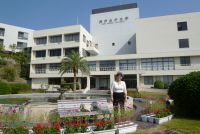
|
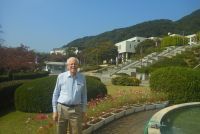
|
2014
July

|
Savant Books and Publishers, Honolulu, Hawaii, have just released their 2014 poetry anthology, Volutions. It contains 36 poems by 14 poets, including two by Hans Brinckmann, Love in the Indian Ocean, and A Lonely End. For details and how to order, see http://www.amazon.com/dp/0991562216
September

|
Author Hans Brinckmann’s announcement:
I’m happy to announce two new publications: a novel and an essay.
My sixth book, In the Eyes of the Son, many years in the making, has just been released. It is a character-based novel, unusual in that it focuses on the realities of life in some of the countries I lived in between the 1950s and the early 1980s: post-war Holland, still-colonized Singapore, wind-swept Chicago, and New York with its racial tensions. The story is full of human drama, rich in dialogue, and with a healthy dash of humor and, well, "intimacy."
The protagonist, Peter van Doorn, dreams of life with a camera. His left-wing father, a journalist and former WWII photographer – at first supports his son’s ambition and even gives him his wartime Leica. But when Peter tries to save someone from a fatal accident instead of "capturing the moment of violent death," Eduard decides that his son lacks the guts for "real" photography, the kind he practiced during the war, the only kind of photography "worthy of a man," even in peacetime. He forces Peter into overseas banking instead.

|
Starting in 1953, Peter's exotic career takes him from his native Holland to Singapore, and on to Chicago where he marries a socialite. But his dream never dies, and at last, in 1978, he sacrifices his stable career and family to embark on the life of a freelance photographer – in New York. Two years later, with his savings running out, an unexpected breakthrough: an exhibition on the provocative theme "White poverty in black New York." But a vicious attack disrupts this first success, leaving him to wonder how he will ever reconcile with a stubborn father with whom he's never seen eye-to-eye.
or the Press Release, click here: http://www.prlog.org/12354368 The book can be ordered from http://www.amazon.com/dp/0991562208 or http://www.amazon.co.uk/dp/0991562208 Both offer Look Inside features. Also available from Amazon Canada, Germany, France, Italy, Spain, and India.

|
Also this month, a Japanese-language literary journal in Tokyo, Atlas, has included Hiromi Mizoguchi's translation of my seven-page essay, Tapestries for the Empress, as the lead piece of their No. 30 issue. It is the fascinating story of Stefan Lubienski, a Polish count I met in 1961 in the Netherlands when he was already in his seventies. He was the director of a high-class retirement home in Driebergen, not far from where my parents lived at the time, and my wife and I stayed at their B&B guesthouse, which was open to the public. When the count discovered that we lived in Japan, he invited us and told us his life story.
He had studied music in Vienna, but was more interested in Eastern religions and philosophy, and wanted to go to Japan. Having no financial means, he moved to Paris to learn how to weave tapestries, as someone had told him he could make a living in Japan with that. Two years later he moved to Japan by ship, with his new-found wife, where he managed to eke out a living weaving tapestries, some of which were even bought by the Empress! There’s much more to his story, and before long I hope to publish the original in English.
The Japan Writers Conference, Morioka, Iwate Prefecture
Saturday October 25 and Sunday 26, 2014.
The conference, hosted by the Iwate National University in Morioka, Iwate Prefecture, was attended by writers, poets, editors and translators writing in English. It was a successful event, with twenty-five varied presentations triggering vibrant discussions.
Your Habri team made two presentations:
Hiromi Mizoguchi: "Literary Magazines in Japan - How to approach them to propose the publication of a translation of an unpublished essay in English."
Hiromi explained how she succeeded in getting one Tokyo-based magazine, Atlas, to publish her translation of one of Hans's unpublished essays.
N.B: In a subsequent meeting with Atlas' editor, he welcomed further submissions of Hans' works.
Hans Brinckmann: "Long Gestation - Harmful or helpful to a Novel?"
Lecture with readings from the novel In the Eyes of the Son, followed by Q&A.

|
Hans related the history of his novel, which took him some seventeen years from conception in Australia in 1997, to rewriting in Japan, to publication by a U.S. publisher in July 2014, with many revisions and considerable pruning. His conclusion: the long gestation benefitted the final product, as witnessed by the highly favorable readers' reactions and reviews on amazon sites. See www.amazon.com or www.amazon.co.uk or www.amazon.co.jp and enter In the Eyes of the Son under "Books."
2013
April
Launching my latest book, "The Tomb in the Kyoto Hills."
On Aporil 9, The Foreign Correspondents Club in Tokyo hosted a Book Break for my latest work of fiction, The Tomb in the Kyoto Hills and other stories, which came out last year. It was the third such occasion for me at the Club, following the introduction of my autobiography The Magatama Doodle in 2005 and a work of history, Showa Japan, the Post-War Golden Age and its Troubled Legacy in 2009.
 |
 |
 |
After a sit-down dinner, the charming chairperson for the evening, Ms. Suvendrini Kakuchi, introduced me to the twenty-five strong audience. I gave a short lecture about my approach to writing why I don't stick to a particular genre, but indulge in producing fiction, non-fiction and poetry, in addition to keeping this website going and then read episodes from the book.
The event concluded with a lively Q & A session.
September
"Meet the Author" at Tokyo American Club
 |
On September 25, at the invitation of the TAC Library Committee, I introduced my book of fiction The Tomb in the Kyoto Hills and other stories at the club.
After an introduction about the background of the book and my diverse forms of writing (fiction, non-fiction, biography, poetry) I read selections from the book's title story. A lively Q & A followed. Though small, the audience showed keen interest in my life and writings. When I told them that I was writing down my wartime experiences in The Hague, there were shouts of "Make that your next book!!"
September
"A look back at post-war Showa and what it means for the Heisei generation" at Cape Tower conference room, Minato- ku,Tokyo.
 |
 |
On September 28, at a bilingual seminar, organized by K.K. Informationer, and attended by about twenty young Japanese men and women. Hans Brinckmann gave a lecture in English, with Japanese translation by Hiromi Mizoguchi. The animated Q & A that followed revealed some of the issues related to the English language, living abroad, and career choices that members of the audience were struggling with.
November
The Japan Writers Conference, Okinawa
November 2 and 3, 2013.
 Hans giving his talk |
 Hans and Hiromi at the post-conference gathering |
We attended the 7th Japan Writers Conference, this time held at a university in Nishihara, near Naha. Writers of every genre gathered there to introduce their writings, exchange experience, and provide guidance to students and aspiring authors attending the sessions.
Some 35 writers of poetry, fiction and non-fiction, alone or in small groups, gave a total of 30 presentations in English over the two-day conference. Most of the presenters live in Japan, but some had flown in from abroad. Subjects ranged from "Writing the short personal essay" and "What Sherlock Holmes can teach writers" to challenging workshops on "Reeling and writhing: poetry editing" and "Writing from Discomfort."
Habri team member Hiromi Mizoguchi talked on "The delights and pains of translating poetry English to Japanese," while Hans Brinckmann stressed the importance of choosing boldly between "First person or Third in writing fiction."
After wrestling with such exciting topics and surviving the demanding Q & A sessions, we were all happy to relax in local pubs and tapas bars and really get to know each other. Hats off to John Gribble for organizing this successful and enjoyable conference.
http://www.japanwritersconference.org/
2012
October
New York City:
Lecture, in English, by Hans Brinckmann for members of the Dutch Financial Club
Title: "A country in turmoil: the rise of popular cynicism and uncertainty in traditionally stable and still prosperous Japan"
Date: Wednesday October 17th, 2012, at noon.
Location: Netherland Club, 3 West 51st Street, New York, NY
100 yards in from 5th avenue between 5th and 6th. North side of the street
Time line:
12 noon - 12:30 pm Attendees and speaker arrive - cocktails served
12:30 pm Sit down for lunch - introductions
1pm Speaker starts with presentation, followed by Q and A
2pm Event ends
November
Fukuoka:
Public Lecture, in English, by Hans Brinckmann, with Japanese interpretation by Hiromi Mizoguchi
Title: "Kizuna kara henkaku e: Bonds are Beautiful, but they won't Fix the Future"
Date: Thursday, 8 November 2012, 7:00 - 8:30 pm
Location: Café & Gallery Kubrick, Hakozaki, Fukuoka http://cafe-gallery.bookskubrick.jp/
1500 yen (drink included) as admission fee. Booking required.
Tel: 092 645 0630 Fax: 092 645 0631 Email: hakozaki@bookskubrick.jp
Hans Brinckmann has lived and worked in Japan, on and off, for over 30 years, since 1950, half that time as a banker, the other half as a writer. He calls himself a conscientious observer of Japanese society, both in its own right and in the international context. He is the author of several books, including two on Japan (see www.habri.jp).
His thoughts on Japan after 3/11 are the subject of his talk, given as part of the Bookuoka book promotion series. He finds that kizuna was rightly chosen as the kanji of 2011, given the remarkable pulling-together of Japanese people from all areas and backgrounds to help alleviate the intense suffering in the afflicted region. But it seems politicians and bureaucrats have been relying too much on the people's self-help based on kizuna, and on the prevailing tendency not to question the actions of "those in charge" - a.k.a. political passivity.
The revelations about the failure of the authorities and the nuclear power industry to prevent the 3/11 disaster, and their actions - or lack of them - since then, are finally waking up the voting public. The anti-nuclear marches this past summer are among the signs of change. Other developments include the emergence of new political activists, including one who says Japan needs a "dictator."
What's really needed are concrete, well-articulated policies, and not only in rebuilding Tohoku and dealing with the nuclear energy issue, but also to secure Japan's stature in Asia and the world. Brinckmann will highlight some of the areas which in his opinion need urgent attention from both the authorities and the general public. Unless the voters get involved, Japan's democracy will continue to be the "work in progress" it has been since the end of the war.
Tokyo:
 |
Presentation of my latest book of fiction, "The Tomb in the Kyoto Hills."
Date: Sunday, November 18th, at 6:30 p.m.
Place: Good Day Books, 2-4-2 Nishi-Gotanda, Shinagawa-ku - 3 minutes' walk from Gotanda Station on the Yamanote Line. This presentation forms part of their BookNotes Speaker Series.
For details and reviews of The Tomb in the Kyoto Hills, go to http://habri.jp/e/writing/book.html
VPRO Radio Interview: Mostly about Poetry

A fifteen-minute interview with Hans Brinckmann and Hiromi Mizoguchi was aired on the cultural program "De Avonden" of the VPRO on Friday 24th February. It is mostly in Dutch, with some comments in English, and one of poem ("Animal Sorrow") read in both English and Japanese.
Below is the text of the interview in English translation:
16 February 2012: Interview by Maarten Westerveen, for VPRO Cultural Program "De Avonden"
(Scheduled to be broadcast on 17/2, it was postponed to 24/2 due to sudden death of Anil Ramdas, a well-known writer and journalist, whose obituary replaced our original time slot.)
Westerveen: First of all, happy birthday!
Brinckmann: Ah, yes - thank you!
W: I'd almost forgotten! Well, you have been invited by Perdu for your poetry. Of course, you've written much more besides poetry, but you've been asked to read your poetry...How did that come about? After all, you live in Japan...
B: Yes, I live in Japan. I did live in Holland for certain periods, not only when I was young, until I left aged 18, but after that too, for two periods of 2 or 3 years each. For the rest of my life I've lived in other countries, so my contacts in Holland are not very strong. But I have friends here, and I also knew about Perdu where I once joined Charlotte Mutsaers - about twenty years ago - in a kind of presentation, a discussion that also included some poetry and philosophy. I had good memories of that event, so when my collection of poetry was published, I thought Perdu might be interested. So during a visit to Amsterdam last summer I stopped by their store, together with Hiromi, my translator...
W: ...who is sitting next to you...
B: Indeed...and we met the present staff of the store, who showed some interest in the book, even though it's written in English and Japanese, not in Dutch, and they agreed to offer it for sale in their shop. A few days later we popped in again, and we had a good chat with the manager, who showed increasing interest in the idea of hosting a reading of poems from the book. We agreed in principle to organize such an event, and returned to Japan. The details were worked out by email.
W: Could you perhaps read one of your poems, to help us understand why they invited you!
B: Ah, yes, of course. Well, in that case... of course, the poems are all in English as you know... I'll read a poem entitled Animal Sorrow.
[reading of the poem]
W: Well, a little later I'd like to ask you why you've chosen to write your poetry in English... but first, as I mentioned already, I'm not here with you alone, but also with Ms. Hiromi Mizoguchi - I hope I pronounced that correctly - and you were so friendly to offer to read it in Japanese, so may I now ask you to do so!
M: With pleasure.
[reading of the poem]
W: Thank you very much.... though I would want to know - the rhythm is completely different in Japanese, and I noticed that you, Mr. B, were reading along in the book while Hiromi was reading aloud, do you hear something very different when you listen to the Japanese translation?
B: Yes, to some extent it is different, though the image of the original comes clearly across, for Hiromi's method of rendering my writings - including poetry, certainly poetry but also prose - is not to give a direct, literal translation of the words, but to recreate the mood. That's why I call her work not the translation of my writing, but her version. It's Hiromi's version of my poems. And that works well, I've noticed.
W (switching back to Dutch): Do they place you in the Japanese tradition, or are you treated as a Western writer who happens to live and write in Japan?
B: I think more the latter, because I myself do not write in Japanese. I do sometimes give a lecture in Japanese... and I believe, generally speaking, the nature of my writings is more non-Japanese than Japanese. That's not to say that it is English or Dutch in nature, but it is NOT Japanese. Perhaps it is more "cosmopolitan" because I've lived in several countries, and something always remains of the places you've lived for some time... Perhaps you should put that question to Hiromi.
W: Uh, the question that Hans couldn't answer, or didn't feel comfortable answering, was how his writings seem - I'm specifically talking about his poems - do they seem to be standing in the Japanese tradition, or do they seem mainly a form of Western writing - a writer writing in a Western way?
M: It's mixed. Very very...you can't categorize his writing. Not only his poetry, but his writing is a mixture of everything, and that also keeps me fascinated.
W: Can you see actually the Japanese influence in his writing?
M: In terms of - I don't know - writing style or...?
W: That I leave up to you, you translated his work. But do you see Japan cropping up in his work? Like I can see this... he probably wouldn't have written that way or wouldn't have paid attention to it if he hadn't spent so much time here.
M: What I could see in his writing, if I'm forced to...
W: ...and you are...
M: ...is, his writing is very... as I said, although he has a sharp observing eye, his writing is sometimes very genteel and soft. So it痴 hardness and softness, and it's a mixture of galloping and just walking sedately... it's a very interesting, unique combination. And the rhythm he creates only by himself.
B: Well, thank you. I didn't know!
W: You hear that for the first time?
B: Yes.
W: Interesting...how the galloping, the hardness of the West alternates with the gentler, leisurely strolling of the Japanese.
B: The way she expressed it just now I hadn't heard before. Yes, it's nice to hear that here in Amsterdam.
W: Perhaps one has to be outside Japan to make a statement like that!
B: Perhaps, yes. Kyo wa kou iu kotoba hajimete kiitemasu. Hatsumimi desu.
W: You translated it?
B: Yes, I translated what I just said.
W: On Sunday you're going to have your reading.
B: Yes.
W: What effect do you expect? What are you hoping to put across? Which aspects of your poems do you hope the audience will pick up?
B: The aspects of my poems which are perhaps most important for me are how I observe other people as well as the unexpected twists in the mental processes and the actions of other people. I never cease being surprised by many aspects of life. Even small children on the street, how is it possible that a child of 4 or 5 behaves already like a young adult, almost independent, with opinions - that amazes me! And I like to express those thoughts in writing. In the end I think it is the awareness of the marvel of life, of living, that runs through my poetry, and that my poems derive their raison d'être mostly from that sense of wonder. Perhaps it sounds rather general, not very specific, but I can't express it better. Poetry, after all, is not a form of prose, not even a form of fiction. It is a separate form of writing, which I have described in my introduction as a kind of bridge between non-fiction and fiction. It manifests itself without you actually looking for it, like wildflowers along a path, under fences, while on the other side of the fence is the large field of monoculture, covered with wheat sown according to a fixed plan. That field, that's non-fiction, or perhaps fiction, but the poems - they are found under the fence, like little flowers here and there. Nobody planted them there, yet they raise their little heads. That surprises me, that intrigues me, and that's what I write about.
W: Arigatoh.
B: Do itashimashite. My pleasure.
LONDON:
Poetry reading: The Undying Day
Bilingual (English/Japanese) reading by Hans Brinckmann and Hiromi Mizoguchi
Tuesday, 14 February 2012, 2:00 - 4:00pm at The Daiwa Anglo-Japanese Foundation Japan House, 13/14 Cornwall Terrace (Outer Circle) London NW1
Click on the symbol below for a recording of the reading: [Link 1]
AMSTERDAM:
Poetry reading: The Undying Day
Bilingual (English/Japanese) reading by Hans Brinckmann and Hiromi Mizoguchi, followed by slideshow and discussion
Sunday, 19 February 2012, 3:00 - 5:30pm at Boekhandel Perdu

The reading was substantially the same as the London reading of 14 February.
VPRO Radio Interview: Mostly about Poetry

A fifteen-minute interview with Hans Brinckmann and Hiromi Mizoguchi was aired on the cultural program "De Avonden" on Friday 24th February. It is mostly in Dutch, with some comments in English, and one of poem ("Animal Sorrow") read in both English and Japanese.
2011
 From left: Prof. Joos, Brinckmann, Prof. Ioroi |
 Hans Brinckmann and Hiromi Mizoguchi |
Poetry Reading
Kochi, Japan:
Brinckmann read from his bilingual poetry collection The Undying Day, with translation of each poem by the translator, Hiromi Mizoguchi.
Date and time: October 21, 2011, from 10.30 to 12.00 a.m.
Place: University of Kochi, Eikokuji Campus, Kochi City, Shikoku.
Host: Professor Takahiro Ioroi, PhD
The 90-minute seminar was attended by about twenty students, both young and mature, and a few members of the faculty.
After my introduction to familiarize the class with my background and approach to language and poetry, I read a selection of my poems from the recently-published The Undying Day, with each poem followed by Hiromi's Japanese version.
During the lively discussion following the reading some of the students commented that hearing poems recited in this way was a far greater pleasure for them than merely reading poetry. Two women said they were "moved to tears" by a poem entitled Animal Sorrow. Another comment concerned the most whimsical of the poems, Making the Last Train. This was found to be "oddly fascinating" and "conveying a rather dark mood" despite its absurd and irrational theme.
One of the older students wanted to know how one can "satisfactorily" translate poetry into another language, given the vast differences in culture, language structure, idiom and frame of reference. I replied that as attempts at straight translation seldom work for poetry, the best one can do is to try and evoke the images and thoughts conveyed in the original in the other language by finding acceptable similes. This is the method employed by Hiromi for my poetry, and the resulting texts are her "versions", rather than translations.
Professor Ioroi later expressed his satisfaction with the seminar, adding that his students were "far more active and outspoken during the discussion than was normally the case."
Public Lecture
"A look back at Post-War Showa, and what it means for the Heisei generation."
Speaker: Hans Brinckmann, in English, with Japanese translation by Hiromi Mizoguchi.
Date and time: October 21, 2011, from 6.30 to 8.00 p.m.
Place: University of Kochi, Eikokuji Campus, Cultural Studies Department, Kochi City, Shikoku
Host: Associate Professor Joel Joos, PhD
I had been asked to speak on "what has changed in Japan" since my first arrival here in 1950, one of the themes of my book, Showa Japan: the post-war Golden Age and its troubled legacy (Tuttle, 2009). I met this request by comparing the "then" and the "now" citing many examples and personal experiences, and presented a brief slideshow of photos taken by me in Japan between the 1950s and 70s, to illustrate my comments.
But given that the lecture was aimed primarily at Prof. Joos' undergraduate students, I used the occasion to stimulate them into a more proactive, internationalist way of thinking than was customary in the 1960s and 70s. In fact, the recent tendency of young Japanese to become increasingly inward-looking and to show little interest in overseas study or employment made this message all the more relevant.
A spirited discussion followed. Below is a selection from the half dozen topics touched upon.
An older, well-spoken lady asked whether the traditional Japanese virtue of "modesty" or "self-restraint" is disadvantageous in diplomacy and international business. In reply I suggested that while modesty may sometimes be appropriate in personal and social situations, in international relations it can be a serious handicap, and lead to being ignored. Even in domestic politics, "modesty" on the part of opposition parties could lead to a dictatorship of the strongest. The general public, too, should not hesitate to state their opinions if they have their own interests at heart.
Someone then raised the issue of Japan's "war guilt." The arguments went back and forth, with one man suggesting that all Japanese must be taught their own wartime history, which is now often skipped in certain textbooks. My own view on the subject, which I made clear, is that it is enough - and necessary - to make children aware that the world's and Japan's history (including 20th century history) is full of wars and atrocities, but take care to avoid overexposing them to the subject to the neglect of more positive and edifying subjects. In other words: Instilling awareness without burdening them with a sense of personal guilt.
There was even a question about the safety of Japan's large holdings of US Treasury bonds: "Will Japan get its money back?" I hedged my answer: there should be just as much legitimate concern about Japan's excessive national debt (at double its GDP the highest by far among advanced economies) as there is about America's fiscal health. Constraint on spending while finding new sources of revenue is needed on all fronts.
Sunday, June 5, 2011
 "Reflection" by Hans Brinckmann |
A Benefit Event for Victims of the Great East Japan Disaster
Venue: Space 1F, Ikebukuro, Tokyo
Event: Hans Brinckmann read poems selected from his just-published bilingual collection of poetry, The Undying Day, together with Hiromi Mizoguchi, who read her Japanese translations of the poems. After the interval, Yoshiko Ieki, a noted harpsichordist gave a live recital featuring works by J.P.Sweelinck and J.S.Bach.
From the Introduction by Hans Brinckmann:
"Literature knows various genres.
Fiction writing is story-telling with a punch or caress.
Non-fiction can be reportage or dissection, cool analysis or hot-blooded pamphleteering - any form of serious writing really as long as it is not fiction or poetry.
Poetry is designed to seduce the ear. It may obey meter and rhyme - or take the form of blank verse. It doesn't have to make sense. It often springs up haphazardly, between the cracks of all that's orderly, like wildflowers along a path, under fences, in a field of planned monoculture.
Poems bridge the chasms between emotion and reason. Their main task is not to conform or inform but to give voice to that which is hidden: to express life rather than describe it.
I've just offered you my justification for the kind of poetry I write. It usually makes sense, I think, but sometimes it doesn't. Even to me.
I'm going to read some poems from my collection The Undying Day, and Hiromi will read her translations - or, because poetry is notoriously difficult to translate, it is perhaps more accurate to call them her versions.
We'll read three sets of three poems each, roughly arranged by theme, as in the book. The themes, which often mutually overlap, are Reflection, Whimsy, and Intimacy."
For further information on the poetry collection The Undying Day please go to http://habri.jp/e/writing/book.html
 |
 |
 |
| Scenes at the June 5 reading. At right Brinckmann is reading one of his 'whimsical' poems. |
||
Charity Event [pdf]
2010
Monday, March 15
Lecture and slideshow by Hans Brinckmann
Topic: The Showa Era
Host: Japan America Women's Club
Venue: International House, Minato-ku, Tokyo
The event, attended by over 55 members and guests, was followed by a book signing.
Hans Brinckmann's available books were all sold.
 |
 |
Wednesday, March 24
Lecture and slideshow by Hans Brinckmann
Topic: Beyond History: Japan and Holland's Mutual Relevance
Host: Japan-Netherlands Society
Venue: Tokyo Midtown West Building, FUJIFILM, Minato-ku, Tokyo
The event was attended by about 35 members and guests.
 |
 |
Tuesday, March 30
Live Interview by Dr. Albert L. Mok, Emeritus Professor, University of Antwerp, with Hans Brinckmann, followed by slideshow
Topic: Japan during Post-War Showa and today. A comparison.
Host: Academic Circle, Antwerp, Belgium
Venue: Kasteel van Schoten (Schoten Castle, near Antwerp)
The event was attended by about 20 members.
2009
October 31 to November 30: Photo Exhibition in Kobe

|
The exhibition of post-war Showa era photographs by Hans Brinckmann and Ysbrand Rogge at the Hyogo International Association in Kobe was successfully concluded at the end of November.
November 26: Lecture and Book Launch in London
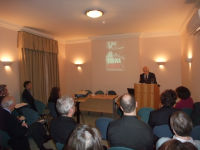
|
The Daiwa Anglo-Japanese Foundation in London hosted a book launch and lecture by Brinckmann on November 26, which was attended by over 60 members and guests. The talk was based on the book Showa Japan: the Post-War Golden Age and its Troubled Legacy and illustrated with a slide show. An animated Q&A session and reception followed the talk.
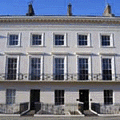
|
Daiwa Anglo-Japanese Foundation
Daiwa Foundation Japan House
13/14 Cornwall Terrace (Regent's Park)
London NW1 4QP
Tel: 020 7486 4348 / Fax 020 7486 2914
November 17: Talk to the English Club, Tokyo
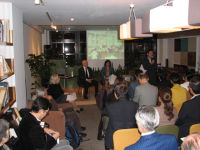
|
Brinckmann addressed an audience of around 50 at The English Club - a monthly activity of the English Speaking Union of Japan - on November 17at the Marunouchi Café in Marunouchi, Tokyo. The talk, with the title "The certainties of Showa as seen from uncertain Heisei", was given in the form of an interview by Hiromi Mizoguchi, the translator of Brinckmann's books and this website. The talk was illustrated with a slide show.
The questions centered on the many uncertainties facing Japan in the present Heisei era (which began in 1989 when Emperor Akihito ascended the throne) compared with the life-time employment, firm social structures, continuous economic growth and other "certainties" of the (post-war) Showa era that preceded it. These subjects are also covered in some detail in Brinckmann's recent book, Showa Japan: the Post-War Golden Age and its Troubled Legacy (Tuttle 2008; Japanese translation published by Random House Kodansha October 2009).
October 31
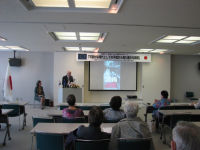
|
To coincide with the opening of the photo exhibition in Kobe, Brinckmann gave a talk, in Japanese, in the venue's lecture room, based on the Japanese edition of his book, Showa Japan. The talk was interspersed with excerpts from the book read out by its translator, Hiromi Mizoguchi.
The audience showed much interest in the subject, and a lively discussion followed the one-hour presentation and slide show. The slides were taken during Brinckmann's decade-long residence in Kobe, starting in November 1950.
October 1: Lecture and Book Launch at Tokyo American Club
 Photo by Hiromi Mizoguchi |
At a "Meet the Author" evening at the Tokyo American Club, Brinckmann introduced his book "Showa Japan" with a talk and slide show. The event was attended by about 40 TAC members and was well received, and almost every attendant purchased one or more of this books.
 |
 |
| Photos: yuuki ide | |
